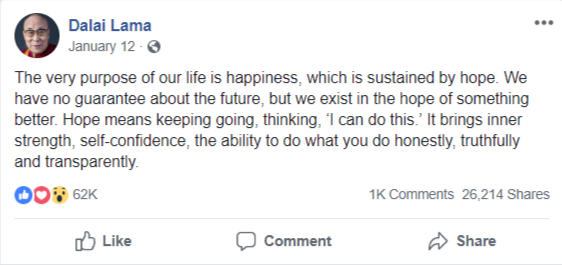I wrote this as a sample passage but it doubles as good advice.
What You Need to Know About Eudaimonia
The pursuit of happiness is a human obsession. It is written into our Declaration of Independence as an “unalienable right.” Even the Dalai Lama posted on his Facebook page that the “very purpose of our life is happiness”:

Yet we tend to go about obtaining happiness in the wrong way. We look for it outside ourselves, in vacations and junk food, in parties and Netflix binges. We often mistake material and fleeting happiness for the only way to get the positive boost we’re seeking. These quick fixes work well as distractions yet actually detract from our overall level of joy.
But why?
We can take a look at dopamine and other chemical explanations later, but for now, we turn to ancient philosophy. Socrates and his students, including Plato and Arristippus, debated the ethics of happiness. Arristippus put forward hedonism, a method that concentrates on pleasure and self-indulgence. It’s an extremely tempting option, but it often excuses selfish behavior. At its worst, hedonism is figuratively consuming a steady diet of empty calories and hoping to stay healthy.
Aristotle discussed a more moderate method. Eudaimonia is like eating a well-balanced meal that also tastes great. Translating into English as “well-being” or “human flourishing,” eudaimonia encourages finding joy in contentment and accomplishment. While happiness is subjective and will vary from person to person, the act of pursuing your happiness in everyday activities will put you on the right path.
Here are a few ways to incorporate eudaimonia into your life:
- Get stuff done. Flourishing has nothing to do with luck and everything to do with effort. You don’t need to cross an entire project off your to-do list to feel accomplished. Break your goals into subgoals and tackle away. Each time you’ve completed a milestone, allow yourself to feel success. Use that glow to propel yourself forward to the next step, or the next goal.
This is harder than it appears and that’s okay. I recently realized that effort doesn’t feel effortless and it isn’t supposed to, which seems obvious given the suffix, but no. My dark voices insisted I was not suited to the task and I believed them. For years, I thought I was weak when anything felt hard or required practice.
Turns out, effort is meant to feel deliberate and potentially challenging.

2. Believe in yourself. It’s okay to tackle the hard things even if you don’t believe you have the skills required. You can learn or you can ask for help along the way. The point is, in the end, you are capable of putting in your best effort. Eudaimonia relishes the journey more than the destination. In fact, you can track your progress by time spent instead of goal achieved. We can’t always predict how long a task will take and often feel discouraged by our own expectations.
Despite Yoda’s sage advice to the contrary, there is “try,” and “trying” is a great start.
3. Explore your purpose. Remember how happiness varies? That’s because we are all individuals with different interests, gifts, and aversions. Fortunately, there is a place for your unique talents in this world. By following your heart and accepting who you are, you will be that much closer to creating a life that suits you. Here’s another secret: accepting yourself is crucial to happiness. Take an honest assessment of who you are- your values, your talents, your challenges, and resolve to be your best self. Be honest and recognize when you’re not. Make a different decision next time.
4. Give yourself a break. You can’t be perfect all the time. In fact, you probably can’t be perfect at all. Flourishing doesn’t mean working yourself into a state of exhaustion. It means taking care of yourself physically, mentally, and emotionally. It means meeting your deadlines and relaxing with your friends. It means setting yourself up for success and keeping your options open.
The world is a very different place now than it was when Socrates engaged in long debate with his students. Not everything about their ideas will transfer neatly into modern society. However, the idea that happiness is not only attainable, but within your grasp, within your control, is timeless.





